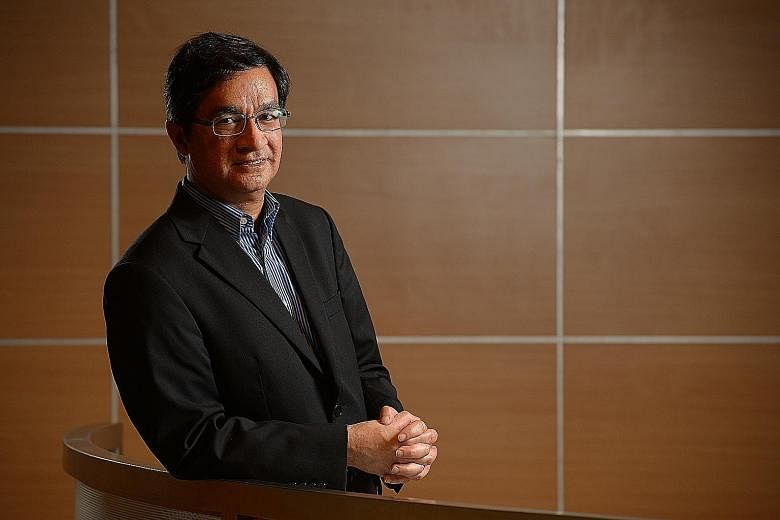Singaporeans have everything it takes to match the big boys on the global stage, and often it's only their own reticence that holds them back from such success.
Mr Stephen Krempl is in a sound position to make that judgment as he has successfully climbed the corporate ladder of some of the world's biggest companies during his time in the United States.
He believes his willingness to stand out from the crowd and be counted was the decisive factor that made his career.
In fact, Mr Krempl, 55, a Eurasian Singaporean who now heads his own Seattle-based human resource consulting firm Krempl Communications International, points to one key moment that made all the difference in his professional life.
It was one day in 1998, when he was working for Yum Brands in Singapore as its training and development director. The global head of human resource of the fast-food giant was in town to present a new corporate culture roll-out.
-
NAME: Stephen Krempl
AGE: 55
JOB: Founder and principal consultant of Krempl Communications
BASED IN: Seattle, United States
"As I sat there listening, along with some 100 executives from around the world, I knew it was not going to work.
"The idea was too Americanised and would certainly fail in Asia. But instead of keeping quiet and complaining in the hallway later, I worked out an alternative curriculum in 15 minutes and shot my hand up," he recalls.
"I remember saying: 'I don't think that's going to work, but I think I have a solution. Do you mind if I come up front and draw it out?' "
That bold move left such a strong impression that he was promoted within four months to head the group's international training division in Dallas, Texas.
"Of course, it's never about speaking for the sake of speaking. You always have to figure it out, create a solution and add value. But that last step, to put your hand up in front of everyone, is why some can make it in a multinational corporate and some can't," he said.
"We Singaporeans, and in fact most Asians, often shoot ourselves in the foot because we've been brought up believing that empty vessels make a lot of noise, and our work will speak for itself. I was as good as everyone in that meeting room - but if I had kept quiet, I probably would never have made it out to the US."
He was more than prepared for the big break, having already worked at Motorola and PepsiCo in Singapore before joining Yum Brands. And when he found himself the only Singaporean at Yum Brands' Dallas office, his upbringing as a minority in Singapore helped.
"Growing up as a minority in Singapore, I had very few Eurasian friends at school. Most of my friends were Chinese, Malay and Indian. But that actually helped me survive outside of Singapore."
Being a minority is not a disadvantage, Mr Krempl noted. It is, in fact, an advantage.
"The minority can leverage on the three X effect - people don't expect you to stand out, so when you do, you leave three times the impression. So you're the only Singaporean in an MNC. You can view yourself as disadvantaged, or you can take the opportunity and stand out," he said.
And that's what he did at Dallas, where he was asked by then Yum Restaurant International president Peter Bassi to create a sustainable training system that could be replicated across different markets.
As a result, he was among the people who engineered the birth of Yum University, the group's renowned series training and excellence centres. The curricula he helped design have trained hundreds of heads of operations globally, he said.
His contributions did not go unnoticed, and by 2002, he had been promoted to vice-president of training and development at corporate headquarters in Louisville, Kentucky.
But his success at Yum Brands was not all down to his work; adaptability was just as important.
"Working overseas can be a drastically different experience and you can easily feel like a fish out of the water.
"In the US, for instance, the management is quite hands-off, you're almost always expected to know what to do.
"So you have to be able to adapt to the changing rules of the game. Many Singaporeans bring with them their own rules and never adapt, only asking: How come it's not like this and that? That mindset is not going to take you anywhere."
Being adaptable again helped him thrive at Starbucks, which he joined in 2005, having been poached by the company to be its chief learning officer at the Seattle headquarters. In that position, he helped Starbucks align its training regime across the vast organisation.
"The first thing that happened when I joined - they made you work as a barista at a shop for two weeks. That's their way to get you to figure out the company's business and philosophy.''
However, he had to leave Starbucks and the US in 2008 as the health of his mother living in Singapore was failing.
The departure gave him the opportunity to chart a new course for his career. "I decided to teach Asian executives how to excel in a multinational company, on the global marketplace."
That was the start of Krempl Communications.
"With my kind of career and background, I have the best of both worlds. You can't tell me I'm that ang moh (Caucasian) who doesn't understand.
"I'm the Asian who's been through the same challenges, and I would show you how to overcome them. That for me has been the most satisfying thing."
From his Singapore base, he has trained executives and directors of UBS, ANZ, Alcon, Applied Materials, OCBC and other companies in Asia, in the ways of business communication and presentation.
In the United States, where his company is headquartered, he is also offering courses at Washington State University.
Now, even as his three children have sunk roots in the US, he still travels back to Singapore every six to eight weeks and considers this place home.
But working overseas is a trial by fire that, he believes, Singaporeans should brave.
"Having gone abroad, you will be able to leverage the best of two worlds, combining a global perspective and an Asian upbringing.
"If I were to choose again, I would still choose to go overseas for at least a few years and come back a much better person.
"You already know you can do well here, so don't miss out on the chance to test and grow your skillset against the best in the world."
STEPHEN KREMPL'S FIVE TIPS TO THRIVE IN A GLOBAL COMPANY
1 Speak up at the right time to get your great results noticed by the right people.
2 Global companies encourage diversity: use your unique cultural background to your advantage.
3 Demonstrate resourcefulness and drive by volunteering to take the lead on global projects or initiatives.
4 Network with colleagues from other countries and demonstrate in-depth familiarity with your region's culture and economy.
5 Connect with your supervisors: discuss topics that they find important or can relate to.


